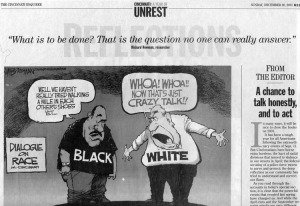Tags
April Martin, Cincinnati Goddamn, Director's Dialogue on Art and Social Change, Paul Hill, Wexner Center for the Arts
The Wexner Center for the Arts steps to the forefront of the complex issues surrounding police and community (especially the African American community) engagement, at a time when both regionally and nationally, we find ourselves in a moment of crisis. It is so easy, in such instances, to get swept up in the immediacy of the situations that we wind up forgetting the historical precedents that paved the way for the current climate.
That is why, the September 2nd screening of “Cincinnati Goddamn” by April Martin (a documentary filmmaker who has targeted the devastation and the aftermath of Hurricane Katrina, women’s health in under-served communities, and alternative avenues in the justice system in a series of shorts) and Paul Hill (who has trained his documentary gaze on the personal story of his transgendered father in “Myth of Father” and served as a contributing film editor on the Emmy-winning doc “A Lion in the House” by Julia Reichert and Steve Bognar) matters so much. This film explores the encounters between Cincinnati police officers and 15 African American men in a six-year period (1995-2001) that resulted in the deaths of those men, the turmoil of their families, and the escalating civil unrest that culminated in riots that drew national attention.
“Cincinnati Goddamn” juxtaposes the heartbreaking efforts of family members and community leaders in pursuit of the truth regarding their loved ones with the seemingly unfathomable accounts of a group of officers and a criminal justice system that fails to live up to its moral ideals, in respect to serving and protecting all members of society. The outrage borne in that six-year span has gained renewed strength in light of a recent spate of tragic scenarios during the last couple of years. To make matters worse, Ohio again has found itself caught up in this current wave of tense standoffs between the two sides.
Personally, it was difficult screening the film immediately following the announcement of the indictment of University of Cincinnati police officer Ray Tensing in the killing of Sam Dubose. Until this incident, Cincinnati had basked in the enviable position of observing the unrest in other cities, knowingly head nodding as the wave of community outrage rose to a fever-pitch; smug, even, as members of the re-gentrified OTR neighborhood (which had been ground-zero for the riots) and the surrounding area, preached about overcoming such trials and tribulations. And yet, here we were again, 15 years later, doomed, it seems, to face another sad reminder that precious little has changed.
All of which makes the screening of “Cincinnati Goddamn” so vital and necessary. Coming as part of the Wexner’s Director’s Dialogue on Art and Social Change series, the event includes a follow-up discussion featuring the co-directors as well as Iris Roley and Dr. Rhonda Y. Williams. Roley, a Cincinnati-based businesswoman and activist was instrumental in the creation of the Cincinnati Police-Community Collaborative Agreement, which captured stories of hundreds of incidents of police misconduct and paved the way for collective remedies. Dr. Williams, the founder and director of the Social Justice Institute at Case Western Reserve University (where she is also an associate professor of history and founder/director of the postdoctoral fellowship in African American studies), has written about race and gender issues in “The Politics of Public Housing: Black Women’s Struggles against Urban Inequality” and launched a book series “Justice, Power, and Politics” through the University of North Carolina Press.
What needs to happen, besides educating the community on the details of these cases that tend to be obscured in the media coverage and the rallying of people to one side or the other in the debates, is a real and honest dialogue about the social and cultural realities that allow these situations to ignite. But even more challenging, for all parties, is the willingness to listen and then offer solutions, workable, everyday solutions to the problems. It does little good to pat ourselves on the back for being able to recognize that problems exist; these concerns date back, not just to the mid-to-late 1990s, but the very founding of our country, and it is time that we come together, as communities, cities, states, and a nation to finally address the issues, head-on.
Go watch “Cincinnati Goddamn” and stay for the dialogue, but be prepared and empowered to take action.
The event, part of the recurring Director’s Dialogue on Art and Social Change, will take place Wednesday, September 2, 2015 at 7pm at Mershon Auditorium. It is FREE for all audiences. For more information, visit www.wexarts.org.)

